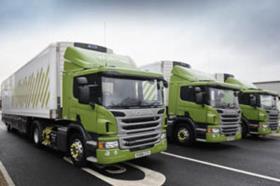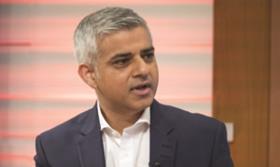The LoCity Annual Conference took place at Freight in the City 2017, offering an opportunity for policy makers, alternative fuel trials and fleet operators to look back at the past 12 months, and ahead to the challenges LoCity faces.
Introducing the session Alex Williams, director of city planning at TfL, looked at the challenges a growing London faces over the next 25 years with a projected population growth of 8.7m to 10.5m: “The mayor's transport strategy is very ambitious in terms of getting the cleanest and safest vehicles on our roads, and we all need to respond and accommodate that.
“The number of trips people make per day is falling and the number of car trips is falling, but the number of van trips is increasing. How do we accommodate that demand and make the road network as efficient as you can? With the exception of the Silvertown tunnel there is no extra capacity in the highway network.”
Williams said that 90% of all freight in London is carried on the road, with the value of the freight moved standing at £200bn annually. As a result TfL understands the value of road freight to the capital and its economy.

In light of this he added that freight was at the heart of one of the flagship policies of mayor Sadiq Khan, to pedestrianise parts of Oxford Street (pictured above), where the biggest challenge will be to accommodate freight deliveries to stores.
Williams also discussed recent regulatory changes – noting the introduction of the T-Charge on 23 October and looking forward to the introduction of the ULEZ on 8 April 2019 – essentially 17 months early.
“A lot of people in the mayor’s consolation said that we were not moving quick enough,” he said of the move in the date of the introduction of the ULEZ. “The next ULEZ consultation will be on widening the ULEZ boundary for HGVs,” he said, adding that the zone could be bordered by the north and south circular, which he admitted would be challenging to deliver.
Up next at the annual conference was Denise Beedell, development manager, Greater London at the Federation of Small Business. She explained that LoCity was something the FSB wanted to get behind “very quickly”.
“We wanted to explore the affordability for our small and micro members. Yes, big fleets have a lot of knowledge, but smaller fleets needed simpler information to make the right decisions for their operation,” she said. “We also wanted to make sure that the planning and procurement activity worked properly, rather than use sticks to beat businesses with.”
She said that key concerns for FSB members over the past 12 months had been total cost of ownership for vehicles that met LoCity standards, while the emissions from auxiliary engines – such as refrigeration units – needed to be considered when it came to mitigating those emissions.
“We will continue to work with vehicle manufacturers as they are the ones who will deliver the vehicles for our members to buy in the showrooms,” she said of plans for 2018.

Next on the slate was Venn Chesterton, innovation lead, low emission vehicle, Innovate UK, who took a spin through several of the trials that the organisation had been helping to run over the past year. “What we already know is that gas vehicles don’t cost a lot more, and in some cases you will save money,” he said of the Air Liquide consortium trial, while noting that a UPS electric trial “had seen us look at how to charge vehicles. They have a large charging point on site with UK Power Networks managing that.”
Forthcoming trials including trailer ergonomics with Lawrence David, a gas trial with CNG Fuels – focused on refuelling options - and a KERS trial with Howdens Joinery.
But how are these trials measured? And how are they evaluated as successful, or not? “How can we prove to legislations, city authorities, operators and the general public that these things lead to improvement? One thing is around climate change and CO2 while the other is around air quality and NoX,” said Chesterton.
To that end, the equation of success is measured as: kms driven, the energy used to drive those kms, and emissions associated with that energy used. If those measures point to a reduction in emissions, then a vehicle is benchmarked against a Euro-6 diesel. This is done under several measures, including performance in areas such as urban environments or trunking routes.
The next trials will focus on refuse collection, he added, and he called on those involved in that part of the industry to participate.

The conference finished with a panel discussion that included contributions from Carl Beet, Transport for West Midlands; Andrew Benfield, Energy Saving Trust and Martin Ellis, Joint Air Quality Unit – looking at lowering emissions in cities and towns across the UK.
Chair and business journalist Simon Jack questioned the panel on its view as to how important EU regulation was to LoCity – and what would happen as a result of Brexit. Williams admitted that EU regulation was overarching in everything they did, but that regional mayors now had such powers over their constituencies that policy would now be driven from the bottom up, rather than waiting for the EU to handle it.
“Looking at the emissions scandal that is a failing of the EU to handle those large businesses, while these metro mayors are up there and doing it,” he said.
Beet said that EU law had given the direction, but that was moving on, while Benfield said that certainty was required in this area in order for policy makers and businesses to plan ahead to make savings and reductions.

A final question was raised from one delegate on the chance of a new mayor, with polarising views on environmental sustainability, coming in to any city and changing the political and policy work done on reducing emissions.
Benfield said that the health benefits of improving air quality would “continue to be a vote winner” while the prosperity of the economy relied on “a healthy, independent, profitable and clean” transport sector for the UK.
“This topic is not going to go away because it is hitting too many buttons. It has achieved cross party support and is not going anywhere,” he said. Ellis concurred, citing cross-party experience in Somerset and Bristol.
Finally Ellis addressed the powers of metro mayors to introduce clean air zones, and said that it was absolutely necessary for freight operators to have a clear view of the requirements and costs associated with those zones. Benfield concurred that there was a need for a national framework and standard, with encouragement beyond compliance.
“If it’s not straightforward that gives people a way out,” he said.
All of the presentations from the LoCity annual conference are available online.














